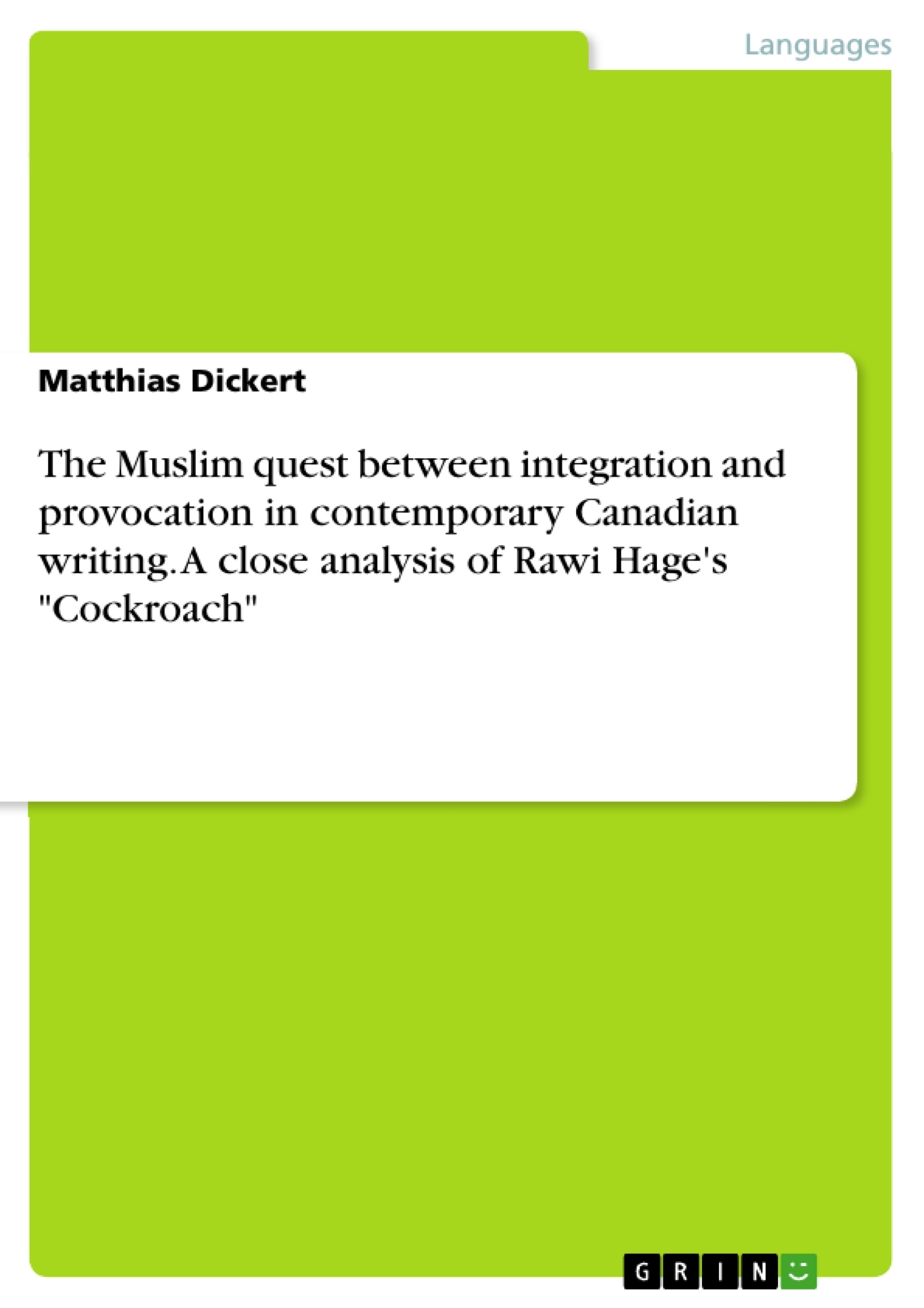This essay is about Rawi Hage's novel "Cockroach", which at first sight is, according to the Daily Telegraph, 'A tale of murder, intrigue and sex from the exuberantly talented Hage'. However, Cockroach embodies more than this (negative) one-sighted approach. It is also a novel of migration, exile, diaspora and being unwanted because of being a foreigner of migrant background and Hage - like Rushdie - explores the hinterland between fantasy, trauma and realism.
The unnamed narrator of the novel takes the reader by the hand and exposes this immigrant life in a chilly surrounding. Chilly because people are cold and chilly because the climate is cold, too. The fact that Hage as a Lebanese born person uses a Canadian setting as the place of action already hints at two conditions of contemporary Muslim writing in general. This refers to the autobiographical basis which many novels have and the use of the city as the background of the narration, two presuppositions of Muslim writing since Rushdie and Kureishi.
Hage, in Cockroach, explores Montreal and presents it as an alien and hostile topography of menial jobs, hidden or open xenophobia, a mix of foreigners, insect behaviours and class hostilities. This narrator, an exotic foreigner himself, despises the world around him and takes the reader through a nightmare of Canadian reality on the basis of his violent childhood, the death of his sister, his exile situation and the helplessness of Canada which fails in the person of a court-mandated psychiatrist. His traumatic past and his inability as a man to protect the female members of his family are also symbols for a failed integration and the personal crisis of the narrator who seeks to find identity and a life at the border of physical and psychological death.
Inhaltsverzeichnis (Table of Contents)
- Abstract
- Notes
Zielsetzung und Themenschwerpunkte (Objectives and Key Themes)
This critical essay analyzes Rawi Hage's novel Cockroach (2008) and its significance within the broader context of contemporary Canadian Muslim writing. The essay aims to explore the novel's themes of migration, exile, and diaspora, focusing on the unnamed narrator's experience as a foreign immigrant navigating a hostile and alienating Canadian environment. It also delves into the literary decisions made by Hage and other contemporary Muslim novelists, highlighting the commonalities in their narratives and the influence of their personal backgrounds.
- The experience of migration and exile for Muslims in the Western world
- The themes of trauma, fantasy, and realism in contemporary Muslim writing
- The representation of Canadian society as alienating and hostile to immigrants
- The role of identity formation in the context of migration and displacement
- The intersections of ethnic literature, minority literature, and multicultural literature in Hage's work
Zusammenfassung der Kapitel (Chapter Summaries)
This essay begins with an analysis of Rawi Hage's novel Cockroach (2008), highlighting its exploration of themes such as murder, intrigue, sex, and migration. The essay then delves into the novel's portrayal of the unnamed narrator's experiences as an immigrant in Canada, emphasizing the chilly and alienating environment he encounters.
Schlüsselwörter (Keywords)
This essay focuses on key themes and concepts including: contemporary Canadian Muslim writing, migration, exile, diaspora, immigrant literature, ethnic literature, minority literature, multicultural literature, and the representation of Canadian society.
Frequently Asked Questions
What is Rawi Hage's novel "Cockroach" about?
It is a novel about an unnamed immigrant in Montreal, exploring themes of exile, diaspora, trauma, and the struggle to find identity in a hostile environment.
How is Montreal portrayed in the novel?
Montreal is depicted as a "chilly" and alienating topography characterized by menial jobs, xenophobia, and class hostilities.
What does the cockroach imagery symbolize?
It serves as a metaphor for the narrator's feeling of being unwanted, his survival instincts, and the insect-like behavior he attributes to himself and others.
What role does trauma play in the narrative?
The narrator's violent childhood and the death of his sister are central to his psychological crisis and his inability to integrate into Canadian society.
How does the book fit into contemporary Muslim writing?
Like Rushdie or Kureishi, Hage uses the city as a background and explores the hinterland between fantasy, realism, and the immigrant experience.
- Quote paper
- Dr. Matthias Dickert (Author), 2017, The Muslim quest between integration and provocation in contemporary Canadian writing. A close analysis of Rawi Hage's "Cockroach", Munich, GRIN Verlag, https://www.grin.com/document/355519



